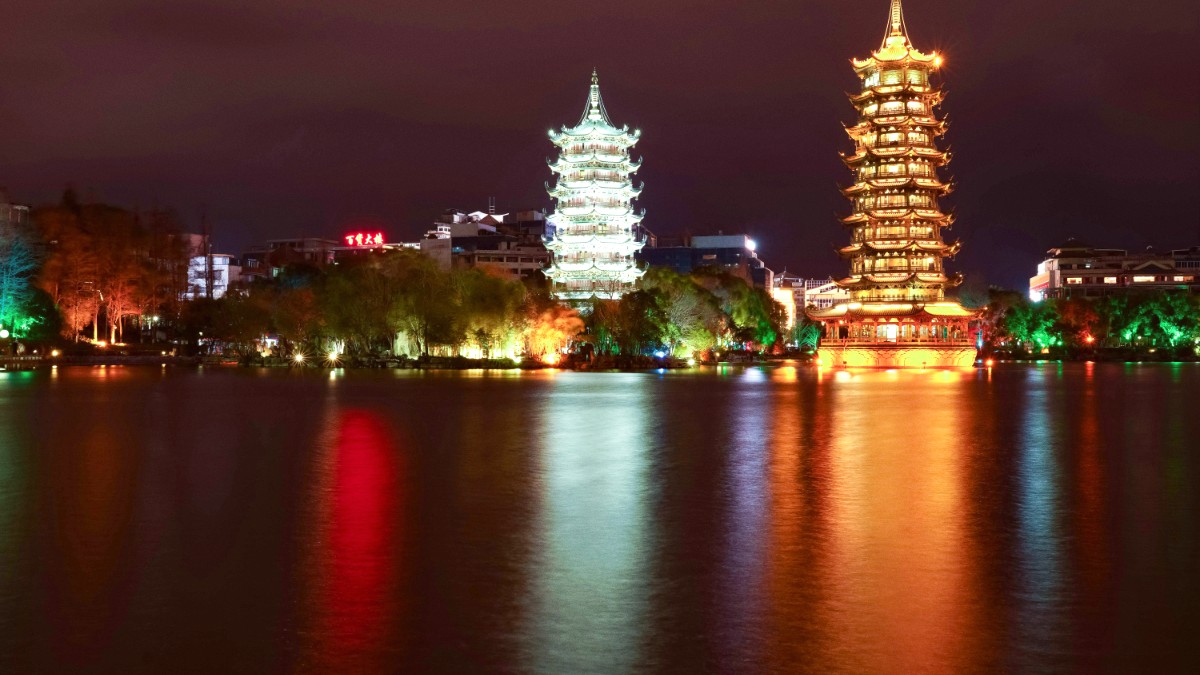
Guangxi, China
Guilin has a humid subtropical monsoon climate with distinct seasons. Each season delivers a different atmosphere and set of experiences.
Spring (March-May): Temperatures range from 15-25°C (59-77°F). Moderate rainfall is common, and the weather is often foggy or misty. Summer (June-August): Expect hot and humid weather, with average temperatures from 26-33°C (79-91°F). This is the period of highest rainfall. Autumn (September-November): Temperatures are pleasant, averaging 18-28°C (64-82°F). Humidity is lower, leading to clearer skies. Winter (December-February): Temperatures are cool to cold, averaging 5-15°C (41-59°F). It is often damp, with some frost but rarely snow.
Guilin is prone to heavy rainfall during the summer monsoon season (June-August). This leads to localized flooding, especially along riverbanks. Monitor local weather forecasts closely if traveling during these months.
While not common, remnants of typhoons occasionally impact the region. These systems bring strong winds and heavy rain, usually between July and September. Stay updated on weather advisories from local sources or your accommodation.
April-May & October
Best weather for activities. Landscapes are lush. Rivers have ample water.
Expect crowds. Prices for accommodation and tours are higher. Book in advance.
March, June, November
Fewer crowds. Prices are more reasonable. Weather stays suitable for activities.
Potential for more rain (June). Temperatures are cooler (March, November). Seasonal tours reduced.
December-February
Very few tourists, serene experience. Prices are lowest for accommodation and tours.
Weather is cold and damp. Some attractions may have reduced hours. Outdoor activities are limited.
The most common visa for tourism is the L visa (tourist visa). Apply at a Chinese Embassy or Consulate in your home country or country of residence. This typically includes submitting an online application form, scheduling an appointment, and an in-person visit for fingerprint collection.
Travelers from certain countries, including the United States, United Kingdom, Canada, Australia, and most EU countries, may qualify for a 144-hour visa-free transit policy. This policy applies when transiting through Guilin Liangjiang International Airport (KWL). You must have a confirmed onward ticket to a third country or region (e.g., Hong Kong, Macau, Taiwan).
Valid for at least six months beyond your intended departure date from China. Needs at least two blank visa pages.
Complete the form online and print it. Ensure all information is accurate and matches your supporting documents.
Recent, color photos meeting specific requirements (white background, no glasses, clear frontal view).
Include round-trip flight tickets and hotel bookings for your entire stay in China. Provide a detailed itinerary.
Bank statements may be requested to show you have adequate funds for your trip.
Plan your budget based on your travel style. Guilin delivers options for every price point, from budget backpackers to luxury travelers.
The official currency of China is the Renminbi (RMB), often called the Chinese Yuan (CNY). Symbol: ¥. Banknotes: ¥1, ¥5, ¥10, ¥20, ¥50, ¥100. Coins: ¥0.1, ¥0.5, ¥1.
Tipping is generally not customary or expected in mainland China, including Guilin. This applies to restaurants, taxis, hotels, and tour guides. Never feel pressure to tip, as it is outside the local cultural norm.
These costs are estimates and can fluctuate based on season, specific choices, and current exchange rates.
Digital Payments are common. Set up WeChat Pay or Alipay with a foreign card before arrival for smooth transactions.
Currency exchange at major banks for better rates. ATMs are widely available for RMB withdrawals. Inform your bank of travel plans to avoid card suspension. Tipping is generally not customary.
Prioritize your health and safety. Travel insurance covers an important safety net.
Consult your doctor or a travel clinic at least 4-6 weeks before your trip. Routine vaccinations (MMR, DTP, Polio, Flu) should be current. Hepatitis A and B are highly recommended. Typhoid is recommended for most travelers.
Rabies for travelers around animals/rural areas. Japanese Encephalitis for month-long stays in rural areas during summer.
Include adhesive bandages, antiseptic wipes, pain relievers, anti-diarrhea medication, motion sickness pills, allergy medication, and any personal prescription medications.
Prevention Strategies
Stay vigilant for common travel health issues. Preventive measures are your best approach.
Traveler's Diarrhea: Drink only bottled or purified water. Avoid ice. Eat well-cooked food. Wash hands frequently. Carry anti-diarrhea medication. Air Pollution: Guilin generally has better air quality than major Chinese cities. Check air quality indexes daily. Mosquito-borne illnesses: Dengue fever is a risk. Use insect repellent. Wear long sleeves and pants.
Bring a KN95 or N95 mask if sensitive to air quality.
Guilin has several general hospitals (Guilin People's Hospital, PLA 181 Hospital). Quality of care varies. For serious medical issues, consider Guangzhou or Hong Kong, which offer more advanced facilities and English-speaking staff.
Widely available. Pharmacists may not speak English. Bring a list of generic names for any necessary prescription medications to secure the correct medicine.
Dial 120 for an ambulance, 110 for police, and 119 for fire services. These are national emergency numbers.
Guilin is a generally safe city with low violent crime rates. Petty crime, like pickpocketing, can occur in crowded tourist areas, markets, or on public transport.
Comprehensive travel insurance holds importance for any trip to China. It covers financial protection against unforeseen events.
Covers medical emergencies and hospitalization costs.
Covers emergency medical evacuation (transport to a higher-quality medical facility or back home).
Covers trip cancellation or interruption, and lost or stolen baggage.